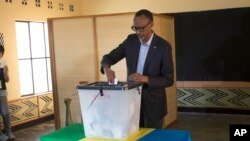The United States congratulates the people of Rwanda on their active and peaceful participation in the presidential election held August 4. More than 6.6 million Rwandans cast ballots for Mr. Kagame, according to the official tally, though this number appears inflated. Just over 80,000 voted for the opposition. The government claimed turnout totaled 97.6 percent.
But the electoral process fell short of democratic standards. State Department spokesperson Heather Nauert said
"We are disturbed by irregularities observed during voting and reiterate long-standing concerns over the integrity of the vote-tabulation process."
The United States commends the Rwandan media for reporting on complaints of harassment of some opposition candidates and Rwandan citizens during the campaign. The U.S. also commends average citizens, the National Electoral Commission, and government officials for speaking out and addressing those complaints. Spokesperson Nauert added, "We applaud the televised [presidential] debate, while noting that voters’ understanding would have benefited from broader participation of the candidates themselves."
The U.S. remains concerned by the lack of transparency in determining the eligibility of prospective candidates. It is hoped the new electoral law to be debated in the next session of parliament will clarify that process well before the 2018 parliamentary elections.
Rwandan President Kagame has led the country of 12 million people since his rebels helped to end the 1994 genocide in which more than 800,000 Tutsis and moderate Hutus were massacred by Hutu extremists. Under President Kagame, Rwanda has made great economic strides, but his critics say this has come at the expense of civil liberties and media freedoms. Human rights groups report that his government has used state powers to silence the opposition through systematic repression.
A constitutional amendment in 2015 allows Mr. Kagame to stay in power until 2034 if he pursues it. The United States expressed disappointment with the change to the constitution and Kagame’s decision to seek a third term.
The United States encourages the Government of Rwanda to foster an environment where civil society and all political parties can participate in elections without intimidation and elections truly reflect the will of the people. The United States stands by the people of Rwanda in their efforts to build strong democratic and inclusive institutions in order to ensure long-term stability and a democratic, prosperous future for all.














